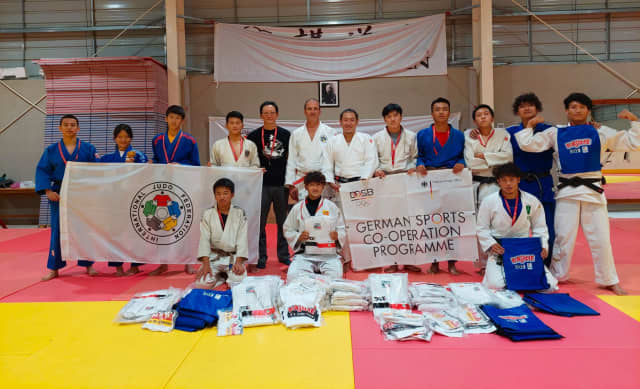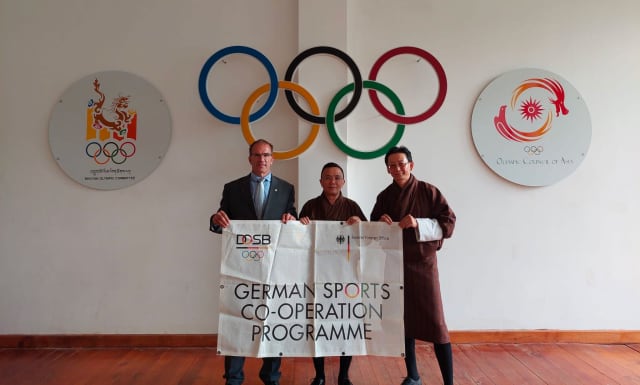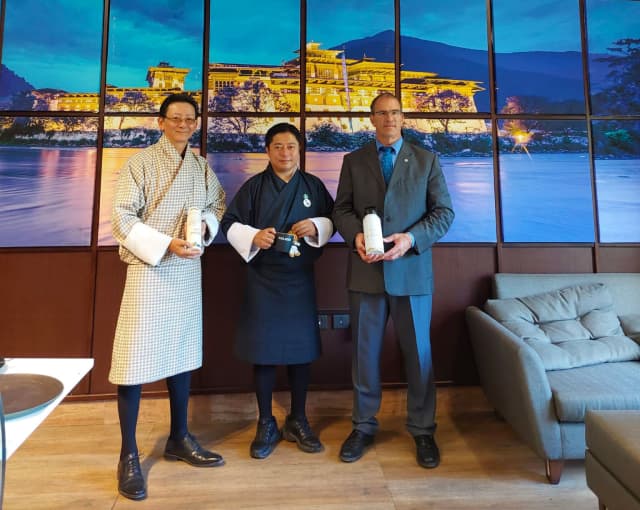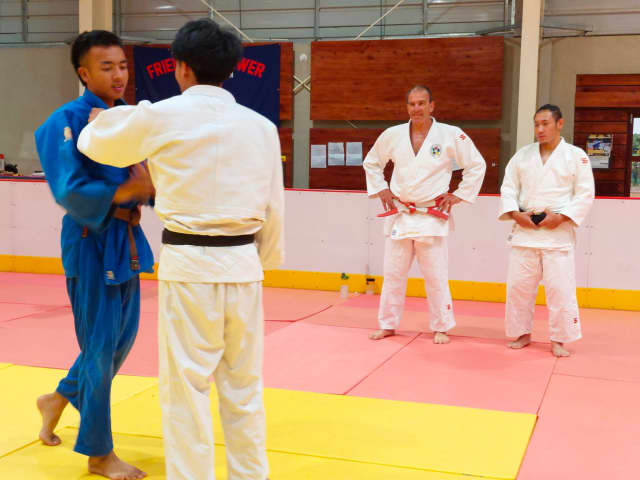Johannes Daxbacher, from the IJF Police commission, visited Bhutan in September, representing DOSB (German NOC) and the German Foreign Office. The purpose of the visit was to understand the status of Bhutan’s judo development programme as well as to conduct judo clinics, while providing some new judogi.
Over the course of the one-week visit, several judo sessions with beginners, intermediates and the senior team were held. With the beginners and intermediates, the focus was on making judo training fun, while with the more experienced judoka, the focus was put on technique combinations, variety and strategy.
During the visit, the Bhutan Judo Association (BJA) arranged several meetings. The first one was with the Secretary General of the Bhutan Olympic Committee, Mr Sonam Tshering, during which subjects such as the current standard of judo in Bhutan, the quality of training programmes, as well as the development of gender equity, were discussed. Mr Tshering expressed his sincere appreciation of the BJA’s achievements in a very short period and with minimal budget.
In the next phase, the idea is to find resources to build more 'mini-dojo' in or near schools. The NOC underlined that they will do their best to identify and approve sites and locations. Since judo has been developing well, the NOC explained that the sport was selected as one of only 6 prioritised sports in Bhutan. These sports will be supported extensively over the next two Olympic cycles and good results will have to be delivered. In order to further raise the quality of judo in the region, more international events will be organised.
Then there was a meeting with the head of the De-Suung Skilling Programme (DSP), Mr Sonam Thinley. Their work is to provide volunteer services during emergencies or for public service actvities. DSP is supporting volunteers as they undergo training in martial arts or other physical training programmes. So far, the BJA has trained many DSP volunteers and an opportunity to continue the programme was discussed.
The next meeting was with Dasho Karma Tshiteem, the Head of Gyalsung. This is a new national service programme initiated by His Majesty the King and is compulsory for all 18 years old high school students. The first programme is scheduled to begin in late 2024. Gyalsung will train 12,000 to 15,000 students every year. It is expected that 2 to 3,000 young Bhutanese will be trained in judo. Gyalsung therefore is an excellent opportunity for promoting judo in the country.
The promotion of gender equity in judo was another area of discussion with the BJA. While almost 50% of BJA members are women or girls at the beginner level, the attrition rate is very high. Daxbacher explained that gender equity is an important facet of the Olympic movement and that a plan should be set up.
Karma L. Dorji, President of the judo federation, said, "The visit was very timely and it helped the BJA explore many new possible areas of growth. We realise that the potential for judo growth in Bhutan is very good. We will, for instance, work on a capacity-building programme to meet the growing need for qualified coaches."
It's been a few years that Bhutan has been active at the national level and on the international scene. With the support of the IJF, the Kodokan and Sabrina Filzmoser, judo has set foot in this small South Asian country, located in the heart of the Himalayas. With only 700,000 inhabitants, Bhutan is described as the 'Land of Happiness and thus the 'gross national happiness' is more important than gross domestic product.
Daxbacher explained, "Bhutan needs more coaches and infrastructures and that is what they will work on in the future. I saw a lot of interest in judo especially among the youth and among girls."
When it comes to development, each step is important. In March (https://www.ijf.org/news/show/in-the-name-of-jita-kyoei), the President of the Kodokan and IJF Executive Committee member, Haruki Uemura, was present in Thimphu, together with Sabrina Filzmoser, Head of the IJF Athletes Commission, and Ayumi Tanimoto, double Olympic champion. Back in 2021 (https://www.ijf.org/news/show/bhutan-s-first-dojo), a first national dojo was inaugurated. All these steps show that judo is on the right tracks in the country and that soon the first fruit should be harvested.




